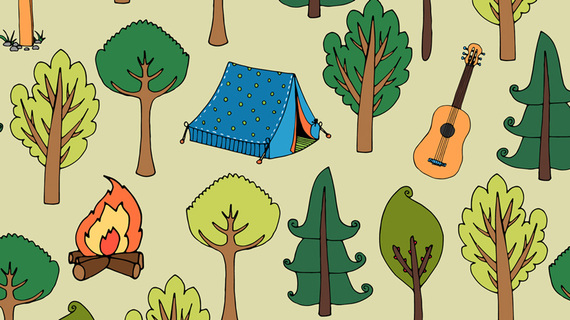
It's called the Campsite Rule. If you've listened to Dan Savage's sex advice podcast, you've probably heard it. The idea goes like this: when two people are in a relationship the more experienced person has the responsibility to leave their partner better than how they found them.
I mean, how nice is that? To meet someone, and to leave them better than how you found them. After hearing Dan Savage's Campsite Rule, I wanted to expand his metaphor beyond romantic relationships, and into my relationship with everyone in the world. And from there I began to re-work his idea into a simple rule for living: I must leave the world better than I found it.
It sounds nice in theory, but how will I measure "better"? It's a lot of pressure for one tiny human like me to wrap his head around.
As I write this I become aware of the room around me: The music I'm listening to came from John Lennon, The MacBook Air I'm writing on was left by Steve Jobs, and the chocolate chip cookies I'm snacking on were invented in the 1930s by a woman named Ruth Wakefield. Each of these things no longer belongs to their original owner. These chocolate chip cookies are more mine than Ruth Wakefield's.
I have this image of John Lennon in my head, and even though he's passed away, his influence ripples far and wide, through other humans currently on the planet, and through future generations. It's as if the human body has the potential to become a giant echo machine.
At this point, you may be thinking, "Yeah, but that's John Lennon. How often do we get a John Lennon? My echoes aren't nearly as important." But you're wrong. Yes we praise the revolutionists, admire movie stars, and remember history in wide chunks. It's easy to get hyper-focused on wanting our lives to result in a BIG echo. Sometimes we'll put tons of negative energy out into the world, as some form of daily sacrifice in pursuit of one day making a BIG dent in the universe. I think that's the wrong way to go about leaving the world better than how you found it.
The better way: start with all the smaller echoes we make each day. Because all our little echoes add up to something big.
Now I'm going to turn it on myself: I want to share with you my top five echoes that I pay attention to each day in order to (hopefully) make the world a better place:
People: How I treat others, especially those with whom I interact daily. This includes my colleagues, my family, and even the cashier at the grocery store. My energy has a huge impact on all of them. Author Ian Maclaren once said, "Be kind, for everyone you meet is fighting a hard battle." This resonates with me.
When I go to sleep each night, I hope to leave the world with more kindness than I require myself. Which sometimes means being kind to those who aren't necessarily in a position to be as kind back to me.
Money: The most powerful echo! With every purchase I approve a new idea, and give the owner of that idea resources, power, and the ability to keep growing. And with every non-purchase, I decide which companies will not thrive as readily. Your consumerism is a weapon. This is sometimes referred to as "Voting with Your Dollar," and it's one of the most significant echoes I can make.
Earth: How I treat the planet. I've made a personal pledge to use products that improve instead of hurt the planet. I limit my consumption of animal products for this reason. It's an imperfect science for sure, so I'm doing my best with what little I know and welcome opportunities to learn more each day.
Ideas: The quality of the ideas that I'm able to share and leave behind . The smallest degree of idea sharing comes at the level of Facebook. The Facebook Wall is an endless hall of echoes. Each post reverberates from one side of the planet to the other. What I choose to share, like, and comment on is a decision to add something positive or negative to the public consciousness.
Children: If I choose to have children, the degree to which I prepare them to send wonderfulness to the future. Neil Postman calls children "the living messages we send to a time we will not see." That's a great responsibility. Kids can become monsters, but they also possess the ability to leave the world better than we left it for them. And if you're a guiding example of how to live well, there's a reasonable probability that they will.
Conclusion
Much of your life was decided before you were born. Applying the Campsite Rule to the whole planet - leave the world better than how I found it - means taking some responsibility for all of those who are still yet to come. Think of the smallest decision you made today. You are so influential that EVEN THAT is a vote for how you believe the future should look.
So please clean up after yourself, because new people arrive everyday.
